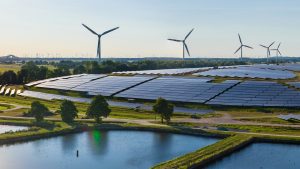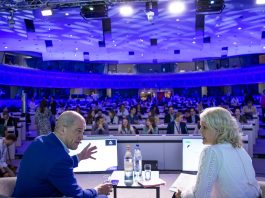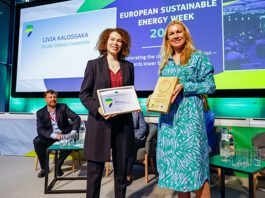Davide Sabbadin, Acting Policy Manager for Climate and Energy, and Alberto Vela, Senior Communications Officer for Climate and Energy at the EEB, a partner organisation of the EUSEW, discuss the vital role of energy efficiency for decarbonisation targets.
Last year, Europe reduced its CO2 emissions by 8%. To do this, the region used and continues to use two powerful strategies: expanding renewables and reducing energy demand.
Although renewables are often in the spotlight, energy efficiency has a vital role to play in Europe’s decarbonisation and energy security.
However, good planning is required for energy reductions.
The importance of energy efficiency
Energy efficiency is the cornerstone of the EU’s triple climate target architecture – emissions reductions, renewables, and efficiency goals. This architecture reinforces and enables one another.
Within this interplay, efficiency facilitates the role of renewables in achieving decarbonisation.
As well as this, energy efficiency offers a clear solution to cut reliance on energy imports amidst energy insecurity. Although scaling up renewables is vital long-term, deployment takes time. In the short term, efficiency is necessary for cutting dependence on fossil fuels from petrol states.
Using less energy to achieve the same results has many economic benefits for administrations, industries, and households. Energy efficiency also improves air quality, creates jobs, reduces energy poverty, and increases asset value.

What does energy efficiency entail?
Energy efficiency encompasses the various measures taken to reduce wasteful consumption. This includes building insulation improvements to the use of more efficient appliances.
It is already important to ongoing market transformations in Europe.
Heat pumps using renewables are around five to seven times more efficient than gas and hydrogen boilers in terms of primary energy consumption. Electric cars are 60-70% more efficient than combustion vehicles.
Electrifying our economy with current technology can achieve savings, given the significant energy losses from fossil fuel combustion.
Improved energy savings are not a given
Despite the introduction of an efficiency-first principle and compulsory targets in the EU Energy Efficiency Directive, improved energy savings are not yet given.
Unrealistic cure-all technologies are distracting demand-side actions.
For example, the EC’s proposed 2040 climate targets have been criticised for overselling carbon capture and storage. Funding for Small Modular Reactors has also been questioned.
On the other hand, energy efficiency with renewables has proven to be climate-effective. The savings resulting from Ecodesign and Energy Label, for instance, have been so significant that all large economies have followed.
Planning is required
The Paris Agreement Compatible (PAC) scenario, a reliable decarbonisation model, suggests the EU can nearly halve its energy demand to achieve climate neutrality by 2040.
The ‘Fit for 55’ package has spurred energy efficiency planning at local levels, such as for heating transition and building renovations. Despite this, the urgency to meet efficiency and renewable targets is straining ministries and local governments, who often lack resources for modelling and planning demand-side measures.
The importance of energy modelling tools
To move the energy transition forward, decision-makers are increasingly relying on energy modelling tools.
REFEREE, the latest free online energy planner under development, will help users quantify the socio-economic impacts of efficiency policies in a specific region or country.
Users will be able to use the tool to determine how many jobs a Member State could create by increasing the annual rate of building renovations, how the air quality index could improve by implementing energy-saving measures, or how public money could be saved by switching to energy-efficient public lighting.









